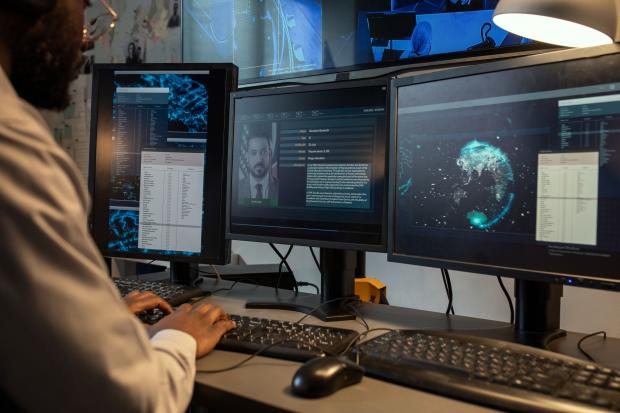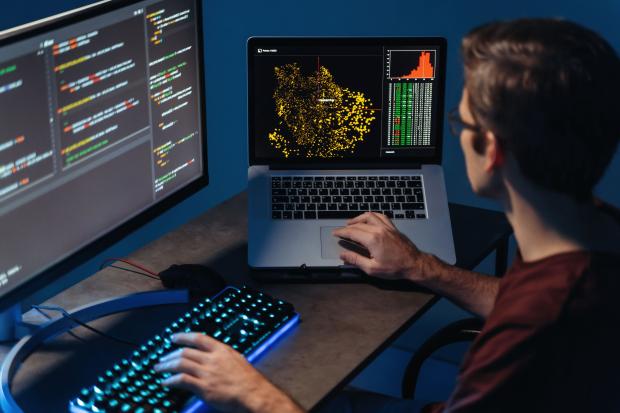If you're a technical professional with a background in digital forensics, you may be considering ways to move ahead in your digital forensics career. While you likely already have a strong foundation in fundamental computer forensics skills, it might be time to build on your knowledge and take your career to the next level.
Many of the skills you'll have relied on early on in your career are foundational technical skills, basic digital forensics skills, and key functional skills that can be developed through a computer forensics bachelor's degree. Advanced digital forensics skills use this foundation as a starting point but allow you to go even deeper in the field to truly become a digital forensics expert. And in an increasingly competitive industry, finding ways to stand out in the field is a smart move.
Here are some of the top advanced digital forensics skills to help you become even better at investigating cybercrime and take the next step in growing your digital forensics career.
Advanced Digital Forensics Skills For Career Growth
1. A Strong Understanding of Various Sectors
If you're looking to advance in your career, understanding the role of digital forensics in a variety of sectors–both public and private –and types of investigations, from corporate criminal investigations to anti-terrorism activities, will be especially valuable. For example, even if you've only worked in one or two digital forensics roles, having a broad skill set and the ability to interact with different organizations and agencies will serve you well.
2. Advanced Investigative Skills
While you likely already have a knack for analytical thinking and an eye for detail, in order to move forward in your career, you'll need to develop advanced investigative skills. These skills will allow you to more effectively evaluate evidence in the context of increasingly complex digital forensics investigations. As a senior digital forensic investigator, you may manage teams of investigators and compile and draw conclusions from even greater pools of evidence in order to solve complex crimes.
3. Software Development
Your early career will have involved becoming familiar with—and ultimately mastering—a variety of digital forensics tools. However, gaining software development skills is vital for taking your expertise to the next level. Learning how to program and develop your tools will ensure that the constraints of existing or proprietary software don’t limit your team. As a digital forensics expert, having the ability to create custom tools tailored to specific investigations can significantly enhance your capabilities.
4. Advanced Communication Skills
Practical soft skills are crucial in any digital forensics career, regardless of how long you've been working in the field. However, as you progress to more senior roles, you'll need to have even stronger communication skills. Senior digital forensic investigators are often called upon to present to both expert and lay audiences. Whether it’s in courtrooms, media interviews, or other high-pressure settings, comfort with public speaking is essential for making an impact and influencing outcomes.
5. Advanced Digital Analysis
While you will likely already have mastered fundamental digital investigation techniques, particularly those relating to the preservation and analysis of digital devices, the next step is to begin developing your methodologies. These methodologies should build upon—and improve—the standards of the field. By doing so, you’ll set yourself apart and make a name for yourself as a leader in the digital forensics community.
6. Knowledge of a Variety of Devices and Data Types
As you become more experienced in digital forensics, your role will naturally expand to encompass a broader range of devices and data types that require analysis. These may include:
- PC and Server Operating Systems: Understanding the intricacies of different operating systems is crucial. Whether it’s Windows, macOS, or Linux, familiarity with their file structures, registry entries, and event logs is essential.
- Portable Devices: Investigating smartphones, tablets, and other portable devices involves handling various file formats, databases, and communication logs.
- Network Traffic and Devices: Analyzing network traffic, routers, switches, and firewalls provides insights into communication patterns and potential security breaches.
- Application Software: Different applications leave traces—whether it’s web browsers, email clients, or specialized software. Knowing where to find relevant artifacts is key.
- Server Software: Servers store critical data, and understanding their logs, configurations, and vulnerabilities is vital.
- Specialized Embedded Systems: These include IoT devices, industrial control systems, and smart appliances. Each has unique challenges for forensic analysis.
- Malicious Software: Investigating malware requires expertise in reverse engineering, behavior analysis, and identifying indicators of compromise.
Having a broadly applicable skillset and the ability to interface with different types of organizations and agencies during your work will serve you well. Whether you’re working on corporate criminal investigations or anti-terrorism activities, understanding the role of digital forensics in various sectors—both public and private—is crucial.
7. Advanced Understanding of Criminal Law
While beginning a career in computer forensics requires a fundamental understanding of the law, white-collar crime, and criminal investigations, senior professionals in the field will need to develop a more profound knowledge of legal principles relating to their sectors and their work.
How Do You Build These Advanced Digital Forensics Skills?

While you'll likely develop some of these skills on the job - especially if you're in a workplace that encourages mentorship and allows you to take on new challenges - many digital forensics professionals find it necessary to go back to school in order to further their careers. Pursuing an online master's degree in digital forensics is a natural next step for those looking to deepen their knowledge and qualify for senior roles. A master’s program provides opportunities to collaborate with other passionate professionals in the field, learn from experienced practitioners, and gain practical insights that can elevate your expertise in digital forensics.
Choosing the Right Digital Forensics Master's Program
Given the field's growing popularity, there are an increasing number of digital forensics degree programs available to prospective students. When selecting a program, consider the following factors:
- Accreditation: Look for a school that is regionally accredited and has a well-recognized digital forensics program.
- Third-Party Validation: Consider rankings from both the higher education industry (e.g., U.S. News & World Report) and the digital forensics industry (e.g., SC Magazine).
- Government Recognition: Programs recognized by government agencies (e.g., Center of Academic Excellence designations) ensure quality and a sound investment in your career future. For example, Champlain College has been designated a Center of Academic Excellence by the National Security Administration and the Department of Homeland Security and a DC 3 National Center of Digital Forensics Academic Excellence by the United States Air Force Office of Special Investigations.
- Learning Style & Program Format: Determine your preferred learning style and if you’d rather pursue an online or campus-based program. Consider your lifestyle, work requirements, and other adjustments you may need to make when pursuing higher education.
Remember, building advanced digital forensics skills requires continuous learning, practical experience, and a commitment to staying current in this dynamic field. By combining foundational knowledge with these advanced skills, you’ll stand out as a sought-after digital forensics expert with a rewarding digital forensics salary.
Digital Forensics Salary: What to Expect
Understanding salary expectations and mastering advanced skills are essential steps toward career excellence. Let’s explore key factors and insights related to digital forensics compensation.
Job Responsibilities and Demand
Digital forensics professionals delve into the digital aftermath of cyber incidents. Their responsibilities vary from role to role and may depend on whether they work in the private or public sector. However, general responsibilities may include dealing with the following:
- Data breaches
- Financial fraud
- Intellectual property theft
- Analyzing digital evidence
- Providing testimony in court & assisting in legal proceedings
Digital forensic analysts must ensure that their digital evidence is admissible, accurate, and preserved in a forensically sound manner.
As organizations increasingly prioritize cybersecurity, the demand for skilled digital forensic analysts continues to surge. These jobs are expected to grow 13% from 2022 to 2032. From corporate entities to law enforcement agencies, everyone seeks digital forensics experts who can recover data, track down cybercriminals, and protect sensitive information.

Experience and Education
Entry-level positions serve as stepping stones, offering valuable foundational knowledge. The average yearly salary for a forensic science technician was $64,940 in May 2023. However, seasoned professionals—those who've weathered countless cyberstorms—command higher pay. As of 2024, the average salary for a senior forensic analyst was $140,562 per year. As you gain expertise in digital forensics, your earning potential grows.
A bachelor's degree in digital forensics, cybersecurity, or a related field provides essential knowledge. But to truly elevate your career, consider pursuing a master's degree. Advanced education not only deepens your understanding but also unlocks better-paying roles.
Location and Compensation
Salaries vary significantly based on geographic regions. Due to increased demand and population growth, metropolitan areas tend to offer top-paying positions. For example, Los Angeles and New York boast some of the highest-paying forensic manager jobs.
Advance Your Career in Digital Forensics Today
Remember, your expertise as a digital forensic investigator is not only valuable—it’s essential in safeguarding digital environments. If you’re interested in advancing your digital forensics career, consider pursuing a master’s degree in digital forensic science from Champlain College Online.
CCO offers a top-ranked, nationally recognized master’s degree in digital forensic science. Through hands-on learning, you’ll gather and utilize digital evidence, apply investigative techniques, and prepare for the complex demands of a digital forensics career. With expert faculty and a cutting-edge curriculum, this quality program equips you to excel as a skilled digital forensic investigator and earn a competitive digital forensics salary.
Contact us to learn more about the MS in Digital Forensic Science degree, or start your free online application today!
Download Program Guide
Learn what you can expect from our online master's in digital forensics program.

Download Program Guide
I acknowledge that, by clicking the "submit" button, I am giving my express written consent to Champlain College and its representatives to contact me about educational opportunities via email, text, or phone, at the phone number above, including my mobile phone, using an automatic dialer, or pre-recorded message. Message and data rates may apply. I understand that my consent is not a requirement for enrollment, and I may withdraw my consent at any time.






